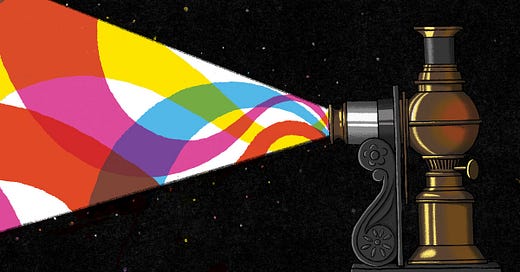Review: “Magic Lantern” (and more) by Garden Gate
Presenting the charming sonic universe of baroque pop stylist Timmi Meskers

Garden Gate is the solo project of North Country, New York-based artist Timmi Meskers, and Magic Lantern is her fist LP release on the dependably exquisite Clay Pipe Music.
Formerly a member of radiophonic instrumentalists White Candles, and part of the Brown Recluse psychedelic pop sextet, Meskers has already proclaimed, through various releases, a personal allegiance for a particular sound that veers between psychedelic and baroque pop, featuring period-specific flourishes of eccentric instrumentation, including mellotron, clavier, harpsichord, and flutes adorning distinctive harmonies and strong melodic statements.
The result of a creative collaboration with author Roan Parrish, this album was originally the score for “Strange Company”, an audiobook anthology published by Audible Originals.
Per Meskers, “As a long-time fan of soundtracks and library music, I was thrilled by the opportunity to see just how much emotion I could compress into the brief connecting links that would augment a furtive kiss, a painful psychic vision, or a breeze across the bones of a scorched landscape.”
The self-titled track of this latest release is exemplary of this illustrative impulse: starring flutes, oboe, and other lesser-heard wind instruments, the theme is a series of plaintive riffs on a gorgeously sinuous melody, a lament floating on top of synthetic strings, while a harpsichord anchors everything in a decisively baroque context.
Elaborate arrangements, chamber orchestra intimacy, and melodramatic sentimentality resonate throughout the entire album, their mannerist elegance suggesting a conscious preoccupation with errant aesthetics tempered by measured formalism.
This quite strict musicological exercise never devolves to camp or parody, only registering as a bold grasp for beauty and all things aesthetically recherché.
The previous Garden Gate LP, “Blood Mansion”, released in late 2021, had already forged an identity weaving together the stylistic mannerisms of what can be considered a major pop genre of our times, at least for a particular set of music lovers.
This strand of pop music insists on a hauntological imagination regarding secret, ignored, and alternative history.
Garden Gate is a perfect representative of this sensibility which includes many others, each with their quirks and differentiations.
What Meskers and her musical peers all share though is a musical identity stylistically defined by an archival obsession with abandoned sounds and bizarre instruments, thematically obsessed with invented timelines, making poetic free associations between narrative conventions, adhering to a maximalist ethos expressed simultaneously with lush orchestrations and emotionally generous harmonies, the entire elaborate confection adorned with sweet melodic lines, teetering precariously on a tight rope over a sentimental abyss, managing somehow to avoid schmaltz yet also free of any rockist prejudice and guilt regarding the pretty, the emotional, the considered fragile.
“Bonfires & Flower Crowns”, originally released in 2018 and originally conceived as an ideal mix-tape for Halloween, opens with mellifluous vocalizations oohing-and-aahing over harpsichord and mellotron, reminiscent of Edda del'Orso and her stylings for '70s Italian soundtrack composers, such as Bruno Nicolai and the master himself, Ennio Moriccone.
As the record progresses, added synth-pop touches, perhaps even vaporwave influences, enrich the arrangements without diluting the elaborate premise of music consciously scoring the arcane musings of an overheated imagination.
Performative and illustrative, the record's playfulness is inspired by the manic thrill of cultivated eclecticism, adhering to the imaginary compilation concept.
As such, the music interprets the varied yet similar mannerisms of a peculiar sensibility, seeking specific commonalities across time and space, satisfying the predilections of a fixated mind ransacking multiple layers of aestheticized listening obsessions and decadent sonic compulsions, all of them bracketed in the broad context of late '20th-century indulgence – melodramatic soundtracks, psychedelic popisms, incidental music for documentaries about hauntings and psychological horror movies are part of this black-lit, Biba-reminiscent sensibility.
Paraphrasing from the sleeve notes, elements of soap opera soundtracks, carnival organs, folksy psychedelia, horror soundtracks, psychedelia, baroque pop, and classical filaments are woven in a complex pattern, their tone ranging from garish to poignant
Dark Harvest, released in 2016, is faithful to a straightforward baroque pop format, its ornate nostalgia and attention to prettiness reminiscent of the late '60s psychedelic pop reanimations concocted during the '90s by revivalists such as Air, The High Llamas, Stereolab, and The Ladybug Transistor, if not directly referencing the optimistic flourishes of original sources like The Zombies.
A fragile accomplishment in the afternoon of perhaps, Garden Gate proposes escapism, eccentricity, and exceptionalism.
It's elitism for the masses.
Text written by Panagiotis Chatzistefanou, Berlin, March 2024



